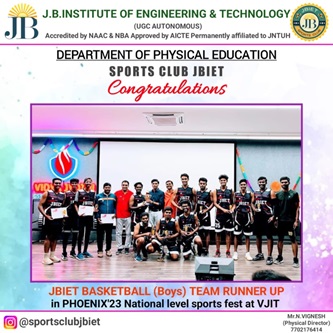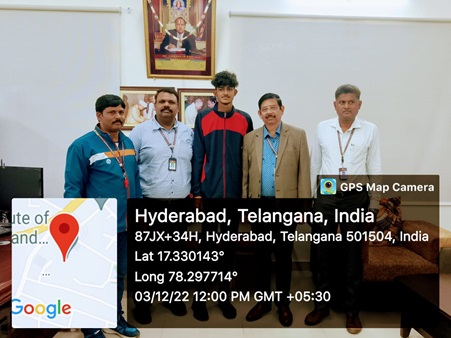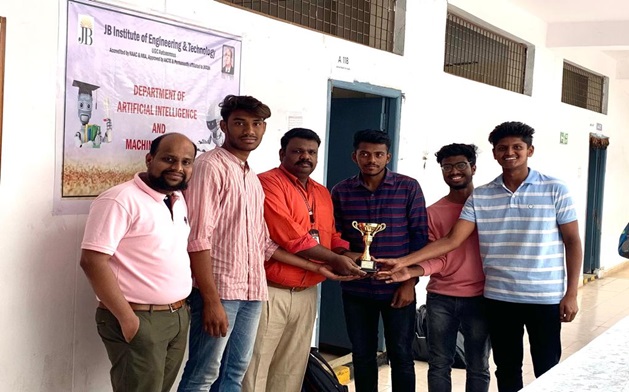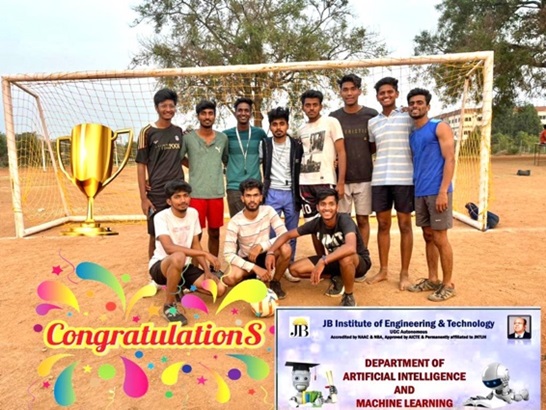About the Department
Artificial Intelligence (AI) is a computing concept that enables a machine to think and solve complex problems as we humans do with our natural intelligence. AI is the next phase of the industrial revolution and has established itself firmly in our society. Almost all branches of industry have been affected by the ongoing transformation through its algorithms.
Machine Learning explores the analysis and construction of algorithms that can learn from and make predictions on data. ML has proven valuable because it can solve problems at a speed and scale that cannot be duplicated by the human mind alone. With massive amounts of computational ability behind a single task or multiple specific tasks, machines can be trained to identify patterns in and relationships between input data and automate routine processes.
The AI & ML has opened up exciting new opportunities for interdisciplinary work across many fields including computer science, mathematics, statistics, and information science from which it draws foundational knowledge and the current demand for a career in AI & ML is considerable and growing daily.
The B.Tech (Artificial Intelligence and Machine Learning) course addresses this transformation by providing you as a student with the broad and in-depth skills required to work with and develop AI. You will be trained how to obtain, process and store enormous amounts of data, which is the root of AI and development processes.
HEAD OF THE DEPARTMENT

Dr.G. Arun Sampaul Thomas M.E., Ph. D (CSE)., M.I.S.T.E., M.I.E.T.
Received B.E. degree in Information Technology, and M.E. and Ph.D. degrees in Computer Science and Engineering from Anna University, Chennai, in 2006, 2010, and 2018, respectively. He is currently working as HOD and Associate Professor in J.B. Institute of Engineering and Technology, Hyderabad, India. He has overall teaching experience more than ten years. His research areas include Data Science, Machine Learning, Computer networks, Big Data Analytics, and IoT. He Presented papers in five international conferences and various national conferences. His papers were published in various reputed international journals. He attended several seminars, and workshops. He is an active life member of ISTE & IET, technical education fellowships.
Phone: 9585511808 E-mail: hod.ai_ml@jbiet.edu.in
Vision And Mission
VISION:
To become a Centre of Excellence in AI&ML, shaping professionals obliging to the research and proficient needs of national and international organizations and to bring up innovative ideas to solve real time problems through continuous research, innovation, and industry steered curriculum.
MISSION:
M1: To transform the students into technologically proficient and help them to absorb the innovative spirit.
M2: To impart premier quality, skill-based and value-based education to the students in the field of Artificial Intelligence and Machine Learning.
M3: To identify corporate requirements and enrich the students’ expertise with a strong theoretical and practical backdrop having an emphasis on hardware and software development with social ethics.
PEO's & PO's
Program Educational Objectives (PEOs)
PEO1
To Formulate, analyse and solve Engineering problems with strong foundation in Mathematical, Scientific, Engineering fundamentals and modern AI&ML practices through advanced curriculum.
PEO2
Analyze the requirements, realize the technical specification and design the Engineering solutions by applying artificial intelligence and machine learning theory and principles.
PEO3
Demonstrate technical skills, competency in AI&ML and promote collaborative learning and team work spirit through multi-disciplinary projects and diverse professional activities along with imbibing soft skills and ethics.
Program Outcomes and Program Specific Outcomes of AI&ML Department (POs & PSOs)
PO1: Engineering Knowledge: Apply the knowledge of mathematics, science, engineering fundamentals and an engineering specialization to the solution of complex engineering problems.
PO2: Problem Analysis: Identify, formulate, research literature, and analyse complex engineering problems reaching substantiated conclusions using first principles of mathematics, natural sciences, and engineering sciences.
PO3: Design / Development of Solutions: Design solutions for complex engineering problems and design system components or processes that meet specified needs with appropriate consideration for public health and safety, cultural, societal, and environmental considerations.
PO4: Conduct investigations of complex problems: using research-based knowledge and research methods including design of experiments, analysis and interpretation of data and synthesis of information to provide valid conclusions.
PO5: Modern Tool Usage: Create, select, and apply appropriate techniques, resources and modern engineering and IT tools including prediction and modeling to complex engineering activities with an understanding of the limitations.
PO6: The Engineer and Society: Apply reasoning informed by contextual knowledge to assess societal, health, safety, legal and cultural issues, and the consequent responsibilities relevant to professional engineering practice.
PO7: Environment and Sustainability: Understand the impact of professional engineering solutions in societal and environmental contexts and demonstrate knowledge of and need for sustainable development.
PO8: Ethics: Apply ethical principles and commit to professional ethics and responsibilities and norms of engineering practice.
PO9: Individual and Teamwork: Function effectively as an individual, and as a member or leader in diverse teams and in multi-disciplinary settings.
PO10: Communication: Communicate effectively on complex engineering activities with the engineering community and with society at large, such as being able to comprehend and write effective reports and design documentation, make effective presentations, and give and receive clear instructions.
PO11: Project Management and Finance: Demonstrate knowledge and understanding of engineering and management principles and apply these to one’s own work, as a member and leader in a team, to manage projects and in multidisciplinary environments.
PO12: Life-long Learning: Recognize the need for and have the preparation and ability to engage in independent and life- long learning in the broadest context of technological change. Any signatory needs to provide an overview of its learning outcomes and confirm that compliance of programs.
PSO1
The ability to understand, analyse and demonstrate the knowledge of human cognition, Artificial Intelligence, Machine Learning and data science in terms of real world problems to meet the challenges of the future.
PSO2
The ability to develop computational knowledge and project development skills using innovative tools and techniques to solve problems in the areas related to Deep Learning, Machine learning, Artificial Intelligence.
Faculty Details
|
S.No
|
Name
|
Designation
|
|
1
|
Dr. ARUN SAMPAUL THOMAS
|
Associate Professor & HOD
|
|
2
|
Dr. KOLLAPARTHY SESHASANKARASARMA VENKATASATYASURYARAMA
|
Professor
|
|
3
|
Dr. AMIT GUPTHA
|
Professor
|
|
4
|
KHALIQ ABDUL SYED
|
Assistant Professor
|
|
5
|
KISHORE VARIGANJI
|
Assistant Professor
|
|
6
|
SATHISHKUMAR SATHISHKUMAR
|
Assistant Professor
|
|
7
|
CHANDRIKA TEENA BHUVANA ALUGULA
|
Assistant Professor
|
|
8
|
ASHA JYOTHI SABNEKAR
|
Assistant Professor
|
|
9
|
BEULAH JESLETBAI KARTHIKEYAN
|
Assistant Professor
|
|
10
|
PAVANI MANYAM
|
Assistant Professor
|
|
11
|
VENKATA SRINIVAS RAO PATNALA
|
Assistant Professor
|
|
12
|
CHAITANYA ENEKEPALLI
|
Assistant Professor
|
|
13
|
RAVI KUMAR DURGA
|
Assistant Professor
|
|
14
|
SAJEENA MOHAMMED ISMAIL
|
Assistant Professor
|
|
15
|
MARYAM FATIMA FAROOQUI
|
Assistant Professor
|
|
16
|
JEYARAJ MARIA SHANTHI
|
Assistant Professor
|
|
17
|
HABEEB NOVERA
|
Assistant Professor
|
|
18
|
MD MAHEBUB ALI
|
Assistant Professor
|
|
19
|
BHUVAN BHEEMANA
|
Assistant Professor
|
|
20
|
ASHOK KUMAR PASUNURI
|
Assistant Professor
|
|
21
|
VENKATA CHANDRA SEKHAR REDDY KAKANURU
|
Assistant Professor
|
Course Materials
II B.Tech II Semester
|
SL.NO
|
Subject
|
Course Material
|
|
1
|
Machine Learning Lab Observation
|
Download Notes
|
|
2
|
Object Oriented Programming Through Java Lab
|
Download Notes
|
Technical Club
Machine Learning Mavericks Club
Exploring, Learning, Innovating Responsibly with Machine Learning
Vision:
To create a community of learners who are passionate about exploring and implementing machine learning technologies to solve real-world problems and drive innovation.
Mission:
- To provide a platform for students to learn and implement machine learning technologies in real-world scenarios.
- To organize technical workshops, seminars, and hackathons to enhance the technical skills of members.
- To encourage members to participate in machine learning competitions and projects.
- To collaborate with industry experts and academia to bring real-world experiences and knowledge to the club.
- To foster a culture of innovation and creativity in the field of machine learning and its applications.
- To provide opportunities for members to network with like-minded individuals and industry professionals.
- To promote the use of machine learning technologies for social good and community development.
(Overall, the Machine Learning Mavericks student club aims to provide a supportive community for students to explore, learn, and apply machine learning technologies to solve real-world problems and contribute to the field of AI and ML.)
Faculty Co-ordinator:
Mr. S. Sathish Kumar (Ph.D.), Assistant Professor, AI&ML Department
Student Co-ordinators:
AI&ML - Section A
Mr. B. Chandrashekar
Mr. Syed Faizanuddin
AI&ML - Section B
Mr. Om Verma
Mr. Koushik Pingilli
Faculty Achievements
Achievements of the Faculty
|
AI&ML Faculty MARIA SHANTHI J was nominated as the Single Point of Contact (SPOC), SWAYAM NPTEL Local Chapter.
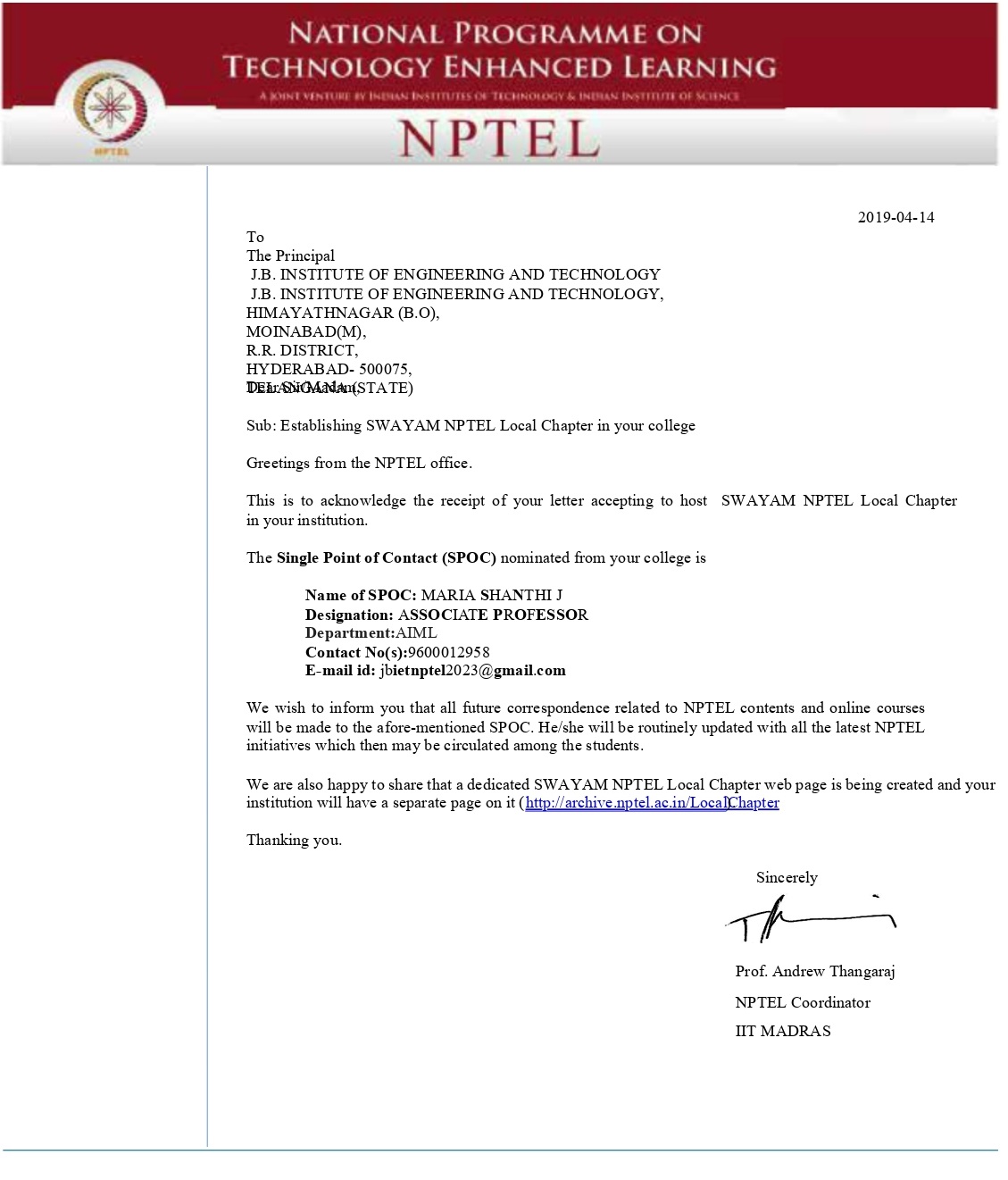
|
ACADEMIC YEAR - 2024-2025
List of R&D Publications (Dr.G.Arun Sampaul Thomas)
https://scholar.google.com/citations?hl=en&user=UU42vyYAAAAJ&view_op=list_works&sortby=pubdate
|
S.No.
|
Publication Category
|
Publication Details
|
DOI
|
-
|
Book Chapter
|
Arun Sampaul Thomas, et al. (2024). “Unleashing the power of XAI empowering decision-making and overcoming challenges in smart healthcare automation” Explainable AI (XAI) for Sustainable Development: Trends and Applications (1st ed.). CRC Press, June 2024, ISBN: 1040038832, 9781040038833, 334 pages. (Scopus Indexed)
|
https://doi.org/10.1201/9781003457176.
|
-
|
Book Chapter
|
Arun Sampaul Thomas, et al. (2024). “Artificial Intelligence governance and comprehensibility. In Renewable energy systems” Explainable AI (XAI) for Sustainable Development: Trends and Applications (1st ed.). CRC Press, June 2024, ISBN: 1040038832, 9781040038833. (Scopus Indexed)
|
https://doi.org/10.1201/9781003457176.
|
-
|
Book Chapter
|
Arun Sampaul Thomas, et al. (2024). “A Review of Green IT, Computing-Enabled, Sustainability-Based Cities: Nurturing Living Standards” Green Computing for Sustainable Smart Cities: A Data Analytics Applications Perspective (1st ed.). CRC Press (Scopus Indexed), March’24
|
https://doi.org/10.1201/9781003388814
|
List of R&D Publications (Dr.Amit Gupta)
|
S.No.
|
Publication Category
|
Publication Details
|
DOI
|
-
|
Scopus IEEE Conference
|
P. S. Rao, S. S. Kumar, N. Habeeb, H. Sharma and A. Gupta, "Chronic Kidney Disease Patients in Predicting Renal Function Decline Integration of Machine Learning Techniques," 2024 4th International Conference on Intelligent Technologies (CONIT), Bangalore, India, 2024, pp. 1-6, doi: 10.1109/CONIT61985.2024.10626029.
keywords: {Training;Machine learning algorithms;Accuracy;Biological system modeling;Transforms;Sensitivity and specificity;Predictive models;Chronic Kidney Disease (CKD);Early Intervention;Prognostic Capabilities;Renal Function Decline;Healthcare Innovation;Patient-specific Data},
|
https://ieeexplore.ieee.org/document/10626029
|
-
|
Scopus IEEE Conference
|
Amit Gupta, Shashi Kant Dargar, Abha Dargar ,Arun Singh Chouhan,” An Effective Investigation On Implementtation Of Different Learning Technique Used For Heart Disease Predection” 11 TH INTERNATIONAL CONFERENCE ON RELABILITY ,INFOCOM TECHNOLOGY AND OPTIMIZATION-2024 ,978-8-3503-5035-7/24, DOI: 10.1109/ICRITO61523.2024.10522150, May’24
|
https://ieeexplore.ieee.org/document/10522150
|
-
|
Scopus Journal
|
Amit Gupta, Movva Pavani,,Shashi Kant Dargar, Abha Dargar,, Arun Singh Chohan,”Improved Extreme Learning Machine Based Hunger Games Search for Automatic IP Configuration and Duplicate Node Detection machine learning”, Journal of Communication, Scopus id ISSN: 1796- 2021 (Online); 2374-4367 (Print), March’24
|
Doi: 10.12720/jcm.19.3.152-160
|
-
|
SCI Journal
|
Sudheer Mangalampalli, ,Hahmi B, Amit Gupta, Ganesh Reddy Karri, TulikaChakrabarti, Sri Hari Nallamala, Chakrabarti Prasun, Bhuvan Unhelkar, MartinMargala”, Multi Objective Prioritized workflow scheduling using Deep reinforcement based Learning in Cloud Computing” IEEE Access - Manuscript ID Access- 2023-30660, Jan’24
|
https://ieeexplore.ieee.org/stamp/stamp.jsp?tp=&arnumber=10382514
|
List of R&D Publications (Mr. S. Sathish Kumar)
https://scholar.google.co.in/citations?hl=en&user=N6YTa2MAAAAJ&view_op=list_works&sortby=pubdate
|
S.No.
|
Publication Category
|
Publication Details
|
DOI
|
-
|
Scopus IEEE Conference
|
P. S. Rao, S. S. Kumar, N. Habeeb, H. Sharma and A. Gupta, "Chronic Kidney Disease Patients in Predicting Renal Function Decline Integration of Machine Learning Techniques," 2024 4th International Conference on Intelligent Technologies (CONIT), Bangalore, India, 2024, pp. 1-6, doi: 10.1109/CONIT61985.2024.10626029.
keywords: {Training;Machine learning algorithms;Accuracy;Biological system modeling;Transforms;Sensitivity and specificity;Predictive models;Chronic Kidney Disease (CKD);Early Intervention;Prognostic Capabilities;Renal Function Decline;Healthcare Innovation;Patient-specific Data},
|
https://ieeexplore.ieee.org/document/10626029
|
-
|
Book Chapter
|
S Sathish Kumar, et al. “A Review of Green IT, Computing-Enabled, Sustainability-Based Cities: Nurturing Living Standards” Green Computing for Sustainable Smart Cities: A Data Analytics Applications Perspective (1st ed.). CRC Press (Scopus Indexed), March’24
|
https://doi.org/10.1201/9781003388814
|
Patent Details:
|
Sl.
No.
|
Title of Patent
|
Name of the Faculty
|
Patent Details
(Application No./Ref. No.
&Date of filing)
|
Status
|
|
1
|
Attention Mechanism for Improved Memory and Computation Efficiency in Transformer Networks.
|
- Dr. G. Arun Sampaul Thomas
- Mr. S. Sathish Kumar
- Mrs. Asha Jyothi
- Mrs. Beulah
- Ms. Maryam
- Mr. Syed Abdul Khaliq
|
German Patent
Deutsches Patent – und Markenamt
Application no. 2023110722303100DE
Filed on: 07.11.2023
Published on 11.12.2023
|
Filed and published
|
|
2
|
SELF-ADJUSTING MACHINE LEARNING PIPELINE FOR FINANCIAL FORECASTING
|
- Dr. G. Arun Sampaul Thomas
- Mr. S. Sathish Kumar
- Mrs. Maria Shanthi
- Mrs. Novera Habeeb
- Mrs. Beulah
|
Indian Patent
Application No.202341074353 A,
Date of filing of Application :31/10/2023
Publication Date: 15/12/2023
|
Filed and published
|
|
Sl. No
|
Name of the Faculty & Designation
|
Date
|
Type of achievement
|
|
1
|
Dr. G. Arun Sampaul Thomas
Mr. S. Sathish Kumar
Mrs. Beulah J Karthikeyan
|
Nov’24
|
Dr. Arun Sampaul Thomas. G., Sathish Kumar, S., Beulah Karthikeyan J. (2024). Digital Infrastructure Assessment and Digital Asset Management: Tools for Decomposition and Efficient Communication in the Fashion Industry. Illustrating Digital Innovations Towards Intelligent Fashion. Information Systems Engineering and Management, vol 18. Springer, Cham. https://doi.org/10.1007/978-3-031-71052-0_25.
Springer Book Chapter (Scopus Indexed)
|
|
2
|
Dr. G. Arun Sampaul Thomas
Dr. Amit Gupta
|
Nov’24
|
Dr. Arun Sampaul Thomas. G, Dr. Amit Gupta et al., "Emotion Classification in Voice Data Using Different Machine Learning Methods," 2024 Second International Conference on Advances in Information Technology (ICAIT), Chikkamagaluru, Karnataka, India, 2024, pp. 1-7, doi: 10.1109/ICAIT61638.2024.10690711.
(IEEE Proceedings – Scopus Indexed)
https://ieeexplore.ieee.org/document/10690711
|
|
3
|
Dr. G. Arun Sampaul Thomas
Dr. Amit Gupta
|
Nov’24
|
Dr. Arun Sampaul Thomas. G, Dr. Amit Gupta et al., "Machine Learning Technique Enabled Learning Methodology for Human Depression Prediction," 2024 Second International Conference on Advances in Information Technology (ICAIT), Chikkamagaluru, Karnataka, India, 2024, pp. 1-6, doi: 10.1109/ICAIT61638.2024.10690553.
(IEEE Proceedings – Scopus Indexed)
https://ieeexplore.ieee.org/document/10690553
|
ACADEMIC YEAR - 2023-2024
List of R&D Publications (Dr.G.Arun Sampaul Thomas)
https://scholar.google.com/citations?hl=en&user=UU42vyYAAAAJ&view_op=list_works&sortby=pubdate
|
1
|
Dr. G. Arun Sampaul Thomas
&
Mr. S. Sathish Kumar, et al..
|
“Predictive Analytics of Climate Change The Future of Global Warming Lies in Data Analytics” (Dec 2023)..
|
Predictive Analytics in Smart Agriculture (1st ed.)
|
eBook ISBN: 9781003391302
|
CRC Press. (Scopus Indexed)
|
|
2
|
Dr. G. Arun Sampaul Thomas, et al..
|
“Broad Framework of Digital Twins in Agricultural Domain” (Dec 2023).
|
Predictive Analytics in Smart Agriculture (1st ed.)
|
eBook ISBN: 9781003391302
|
CRC Press. (Scopus Indexed)
|
|
3
|
Dr. G. Arun Sampaul Thomas
&
Mr. S. Sathish Kumar, et al..
|
- Future of Medical Research with a Data-driven Federated Learning Approach” Handbook on Federated Learning: Advances, Applications and Opportunities (1st ed.). (Dec 23)
|
Handbook on Federated Learning: Advances, Applications and Opportunities (1st ed.).
|
eBook ISBN: 9781003384854
|
CRC Press. (Scopus Indexed)
|
|
Sl. No
|
Name of the Faculty & Designation
|
Date
|
Type of achievement
|
|
1
|
Dr.G. Arun Sampaul Thomas
|
06-07-2023
|
Certificate of Appreciation from NPTEL for being Active SPOC of Swayam-NPTEL Local Chapter [Jan- April 2023]
|
Papers Published by faculty in Journals:
Sl.
No. |
Name of the Author(s)
|
Name of the Journal
|
Title of the paper
|
Indexed in
|
Vol. No and Page nos.
|
ISBN/ ISSN
|
Date
|
-
|
Dr.G. Arun Sampaul Thomas
&
Mr.S.Sathish Kumar
|
International Journal of Image and Graphics.
|
Classification and Analysis of Pistachio Species Through Neural Embedding-Based Feature Extraction and Small-Scale Machine Learning Techniques
|
Scopus
|
Online ready
|
Online ready
|
02-03-2023
|
Patent Details:
|
Sl.
No.
|
Title of Patent
|
Name of the Faculty
|
Patent Details
(Application No./Ref. No.
&Date of filing)
|
Status
|
|
1
|
Attention Mechanism for Improved Memory and Computation Efficiency in Transformer Networks.
|
- Dr. G. Arun Sampaul Thomas
- Mr. S. Sathish Kumar
- Mrs. Asha Jyothi
- Mrs. Beulah
- Ms. Maryam
- Mr. Syed Abdul Khaliq
|
German Patent
Deutsches Patent – und Markenamt
Application no. 2023110722303100DE
Filed on: 07.11.2023
Published on 11.12.2023
|
Filed and published
|
|
2
|
SELF-ADJUSTING MACHINE LEARNING PIPELINE FOR FINANCIAL FORECASTING
|
- Dr. G. Arun Sampaul Thomas
- Mr. S. Sathish Kumar
- Mrs. Maria Shanthi
- Mrs. Novera Habeeb
- Mrs. Beulah
|
Indian Patent
Application No.202341074353 A,
Date of filing of Application :31/10/2023
Publication Date: 15/12/2023
|
Filed and published
|
AI&ML – Staff Sports Achievements
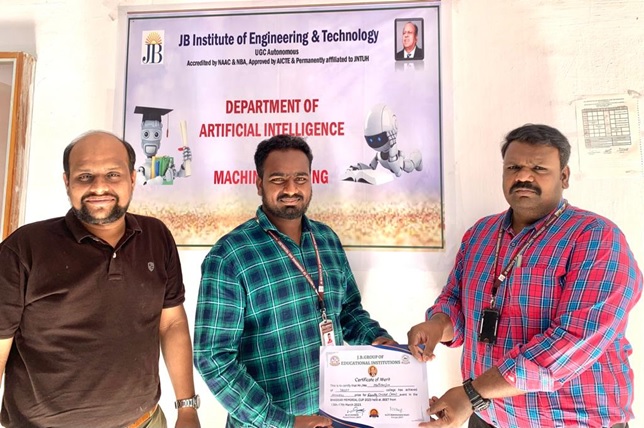
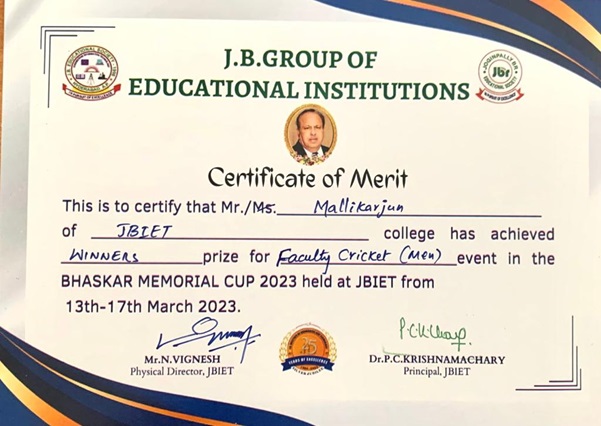
Seminars / Works Shops / FDP
Seminars / Workshops / Training Programs organized
|
Sl.No.
|
Name of the Expert and Affiliation
|
Lecture Topic
|
Date(s)
|
-
|
Dr. I. S. Hephzi Punithavathi
Associate Professor - CSE(AI&ML) Department
VJIT, Hyderabad
|
Academic Expert Guest Lecture on “Machine Learning and its Applications”
|
18-12-2024
|
-
|
Mrs. Laxmi Hugar
Assistant Professor – IT Department, VJIT, Hyderabad
|
Academic Expert Guest Lecture on “Cloud Infrastructure and its services”
|
18-12-2024
|
-
|
Mr. Y. Prabhu Kumar
Associate Professor – CSE Department, VJIT, Hyderabad
|
Academic Expert Guest Lecture on “Future of AI with General Adversarial Networks”
|
20-12-2024
|
-
|
Mrs. Uma Mythraye
Assistant Professor – Department of AI, VJIT, Hyderabad
|
Academic Expert Guest Lecture on “Chat GPT and its Applications”
|
20-12-2024
|
-
|
Mr. Md Shamshad
Associate Professor – AI&ML Department, KGRCET, Hyderabad
|
Academic Expert Guest Lecture on “Human Computer Interaction and its Applications”
|
21-12-2024
|
-
|
Ms. Parul Gupta
Associate Professor –Department of AI, VJIT, Hyderabad
|
Academic Expert Guest Lecture on “AI for Climate Change”
|
21-12-2024
|
-
|
Mr. Devdas
Associate Professor - CSE(AI&ML) Department, KGRCET, Hyderabad
|
Academic Expert Guest Lecture on “AI for Healthcare”
|
19-12-2024
|
|
S. No.
|
Name of the Coordinator(s)
|
Designation
|
Title of the Seminar/ Workshop
|
Date
|
Target Group
|
No. of Beneficiaries
|
|
1
|
Mr. P. Ravi Kumar
|
Software Engineer Technologies, Hyderabad
|
Workshop on “Fundamentals of Cloud Computing (AWS)”
|
20-01-2023
|
2nd Year Students of AI&ML
|
140
|
Seminars/ Workshops/ Conference/ FDPs attended by faculty
|
S.No.
|
Name of the Faculty
|
Designation
|
Title of the Seminar / Workshop / Conference / FDP
|
Organized by
|
Date(s)
From-To
|
|
1
|
Dr.G. Arun Sampaul Thomas
|
Associate Professor
|
Deep Dive in Deep Learning Analytics
|
University of Hyderabad
|
05-07-2023
|
|
2
|
Dr. Sankara Sarma
|
Professor
|
Deep Dive in Deep Learning Analytics
|
University of Hyderabad
|
05-07-2023
|
|
3
|
Beulah J Karthikeyan
|
Assistant Professor
|
Deep Dive in Deep Learning Analytics
|
University of Hyderabad
|
05-07-2023
|
Student Achievements
Expert lectures organized for students:
|
Sl.No.
|
Name of the Expert and Affiliation
|
Lecture Topic
|
Target group
|
Date(s)
|
|
1
|
S. Sathish Kumar, JBIET
|
Goal Setting
|
Students of AI&ML
|
29-10-2022
|
Guest lectures organized for students:
|
Sl.No.
|
Name of the Guest and Affiliation
|
Lecture Topic
|
Target group
|
Date(s)
|
-
|
Mr. E. Chaitanya, Senior Software Engineer, GAP Inc. Hyderabad
|
Industry Expert Guest Lecture on “The Growing Importance of Mobile E-Commerce"
|
2nd Year Students of AI&ML
|
21-04-2023
|
-
|
Mrs. Teena, a renowned System Administrator from ICE DATA SERVICES INDIA PRIVATE LIMITED, Hyderabad
|
Industry Expert Guest Lecture on “Introduction to System Administration"
|
2nd Year Students of AI&ML
|
21-04-2023
|
-
|
Mr. Om Verma, Mr. Koushik, Machine Learning Mavericks Club
|
One day Student forum on “Applications of AI & Introduction to Julia” on
|
2nd Year Students of AI&ML
|
12-04-2023
|
-
|
An Expert Team from “Bhaskar Medical College”, A Sister Institute of JBIET
|
One day Awareness Program on “Medical Emergencies”
|
2nd Year Students of AI&ML
|
21-03-2023
|
-
|
An expert team from Moinabad Police Station
|
One day “Self Defence Training program for Girl Students”
|
2nd Year Students of AI&ML
|
28-03-2023
|
Prizes won by the students in Paper contests:
|
Sl.No.
|
Student Details
|
Title of the paper
|
Dates and Place
|
Prize
Awarded
|
|
1
|
Om Verma, Kaushik Pingili
|
Multiclass Classification of Intellectual Quotes using
Transformers
|
11-03-2023, JBIET
|
First Prize
|
|
2
|
Malavika Joshi, Shada Manogna
|
Machine Learning-Based Credit Card Fraud Detection: Evaluating Standard and Hybrid Techniques with Majority Voting
|
11-03-2023, JBIET
|
Second Prize
|
Papers presented by the students in Conferences:
|
Sl.No.
|
Title of the paper
|
Name(s) of Author(s)
|
Details of Proceedings
(in IEEE format)
|
|
1
|
Machine Learning-Based Credit Card Fraud Detection: Evaluating Standard and Hybrid Techniques with Majority Voting
|
Malavika Joshi1, Shada Manogna2, Mrs. Beulah J Karthikeyan3*, Dr. Sankara Sarma KVSSRS4
|
Malavika Joshi, Shada Manogna, Mrs. Beulah J Karthikeyan, Dr. Sankara Sarma KVSSRS, Machine Learning-Based Credit Card Fraud Detection: Evaluating Standard and Hybrid Techniques with Majority Voting, International Journal of System Design and Information Processing (SDIP), ISSN: (Print): 2319-9288 | (Online): 2321-0591
|
|
2
|
Using multiple methods including Naïve Bayes, K-
Nearest Neighbours, and Decision Tree Algorithms
with Ensemble Learning to diagnose diabetes
|
Mahek Tikedar1, Rallapalli Lakshmi Chandana2 , Mrs. Beulah J Karthikeyan3*Dr. Sankara Sarma KVSSRS4
|
Mahek Tikedar, Rallapalli Lakshmi Chandana, Mrs. Beulah J Karthikeyan, Dr. Sankara Sarma KVSSRS4, Using multiple methods including Naïve Bayes, K-Nearest Neighbours, and Decision Tree Algorithms
with Ensemble Learning to diagnose diabetes, International Journal of System Design and Information Processing (SDIP), ISSN: (Print): 2319-9288 | (Online): 2321-0591
|
|
3.
|
Multiclass Classification of Intellectual Quotes using
Transformers
|
Om Verma1, Kaushik Pingili 2 , Dr. G. Arun Sampaul Thomas 3* , S. Sathish Kumar4
|
Om Verma, Kaushik Pingili, Dr. G. Arun Sampaul Thomas, S. Sathish Kumar, Multiclass Classification of Intellectual Quotes using
Transformers, International Journal of System Design and Information Processing (SDIP), ISSN: (Print): 2319-9288 | (Online): 2321-0591
|
|
4.
|
Exploring the Effectiveness of Supervised Learning
Algorithms for Identifying Suicidal Thoughts in
Textual Data
|
M. Sanjana Ninni1 , Harika Musku2 , S. Sathish Kumar3* ,G. Arun Sampaul Thomas
|
M. Sanjana Ninni, Harika Musku , S. Sathish Kumar ,G. Arun Sampaul Thomas, Exploring the Effectiveness of Supervised Learning
Algorithms for Identifying Suicidal Thoughts in
Textual Data, International Journal of System Design and Information Processing (SDIP), ISSN: (Print): 2319-9288 | (Online): 2321-0591
|
Student Club Activities:
|
Sl. No
|
Name of the Student Club
|
Activity Conducted
|
Date
|
No. of participants
|
|
1
|
Machine Learning Mavericks Club
|
One Day Student Forum on “Applications of AI & Introduction to Julia Programming”
|
12-04-2023
|
140
|
Industrial Visits
|
Sl. No
|
Name of the Industry
|
Date of Visit
|
Target group
|
No of students
|
Outcome
|
|
1
|
DRDL Hyderabad
|
17-04-2023
|
2nd Year Students of AI&ML
|
140
|
The visit offered our AI&ML students a chance to learn about DRDL's research and development and expand their knowledge of the defense technology industry.
|
Internships
|
Sl. No
|
Name of the Company
|
Student Details
|
Duration
|
Date From-to
|
No of students
|
Outcome
|
|
1
|
Verzio Pvt. Ltd.,
|
2nd Year Students of AI&ML
|
4 Weeks
|
2-1 (AY 2022-23 / I sem)
|
30
|
Students grasped AI&ML applications through project-based learning supported by the company.
|
|
2.
|
Lbits Pvt. Ltd.,
|
2nd Year Students of AI&ML
|
4 Weeks
|
2-1 (AY 2022-23 / I sem)
|
51
|
|
3.
|
Y-Hills solutions.,
|
2nd Year Students of AI&ML
|
4 Weeks
|
2-1 (AY 2022-23 / I sem)
|
23
|
|
4.
|
V-Cube Pvt. Ltd.,
|
2nd Year Students of AI&ML
|
4 Weeks
|
2-1 (AY 2022-23 / I sem)
|
36
|
AI&ML – Students Sports Achievements:
Research and Development
Research Activities - Thrust areas of research of the department.
|
Sl.No.
|
Name of the Thrust Area
|
|
1
|
Deep Learning
|
|
2
|
Machine Learning
|
|
3
|
Natural Language Processing
|
|
4
|
Computer Vision
|
Papers Published by faculty in Journals
| S.NO. |
Name of the Author(s)
|
Name of the Journal
|
Title of the paper
|
Indexed in
|
Vol. No and Page nos.
|
ISBN/ ISSN
|
Date
|
-
|
Dr.G. Arun Sampaul Thomas,
S. Sathish Kumar
|
International Journal of Image and Graphics.
|
Classification and Analysis of Pistachio Species Through Neural Embedding-Based Feature Extraction and Small-Scale Machine Learning Techniques
|
Scopus
|
Online ready
|
Online ready
|
March 2023
|
-
|
Dr. Amit Gupta
|
IEEE Access, vol. 12, pp. 5373-5392, 2024, doi: 10.1109/ACCESS.2024.3350741.
|
Multi Objective Prioritized Workflow Scheduling Using Deep Reinforcement Based Learning in Cloud Computing
|
Scopus
|
Online Ready
|
Online Ready
|
Jan 2024
|
Books/ Chapters published by the faculty members
|
Sl.No.
|
Name(s) of the author(s)
|
Title of the Book/ Chapter
|
Book Type
|
ISBN Number
|
Publisher
|
|
1
|
Dr.G. Arun Sampaul Thomas
|
Future of Medical Research with a Data-driven Federated Learning Approach
|
Handbook on Federated Learning: Advances, Applications and Opportunities (1st ed.). CRC Press. https://doi.org/10.1201/9781003384854.
|
Online ready
|
CRC Press
|
|
2
|
Dr.G. Arun Sampaul Thomas
|
Broad Framework of Digital Twins in Agricultural Domain
|
Predictive Analytics in Smart Agriculture (1st ed.). CRC Press. https://doi.org/10.1201/9781003391302.
|
Online ready
|
CRC Press
|
|
3
|
Dr.G. Arun Sampaul Thomas,
S. Sathish Kumar,
Mrs. Beulah
|
Predictive Analytics of Climate Change The Future of Global Warming Lies in Data Analytics
|
Predictive Analytics in Smart Agriculture (1st ed.). CRC Press. https://doi.org/10.1201/9781003391302.
|
Online ready
|
CRC Press
|
|
4
|
Dr.G. Arun Sampaul Thomas,
S. Sathish Kumar
|
Green IoT use case approaches for blockchain technology taking industry 5.0 to the next level
|
Elsevier Book Chapter- Green Blockchain Technology for Sustainable Smart Cities
(Scopus indexed)
|
978-0-323-95407-5
|
Elsevier
|
Patents Filed/ Published/ Granted
|
Sl.No.
|
Title of Patent
|
Name of the Faculty
|
Patent Details
(Application No./Ref. No.
&Date of filing)
|
Status
|
|
1
|
SELF-ADJUSTING MACHINE LEARNING PIPELINE FOR FINANCIAL FORECASTING |
Dr.G. Arun Sampaul Thomas,
Mr. S. Satish Kumar,
Mrs. Maria Shanthi,
Mrs. Novera Habeeb,
Mrs. Beulah
|
Application No.202341074353 A, Indian IPR, Dec 2023
|
Published
|
|
2
|
Machine Learning Strategy for Performance Enhancement of Phase Change Material for A Smart Control
|
Dr.G. Arun Sampaul Thomas
|
Application No. 202241067599, Indian IPR, Nov 2022
|
Published
|
Teaching and Learning Process
Innovations in Teaching and Learning
Introduction: The Department of AI&ML is committed to innovative and effective teaching practices that help students to better understand and apply the concepts they are learning, as well as develop important skills that are necessary for success in the field. In this report, we will discuss the innovative teaching and learning techniques followed by the department.
Project-Based Learning: The Department of AI&ML uses project-based learning as a teaching method that focuses on students working on a long-term project or problem that is based on real-world scenarios. This approach allows students to apply their knowledge and skills in a practical way, while also developing critical thinking and problem-solving skills.
For example, students in the B.Tech AI&ML program may work on a project where they are asked to analyse a large dataset and develop a machine learning algorithm that can make predictions based on the data. Students are provided with real-world datasets and are required to work in teams to develop and test their algorithms. This approach not only helps students to apply the concepts they are learning in the classroom to real-world scenarios, but also helps them to develop important teamwork and communication skills.
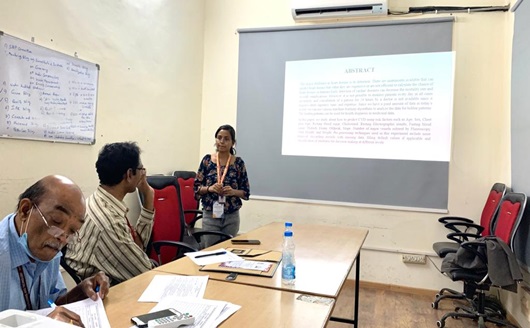
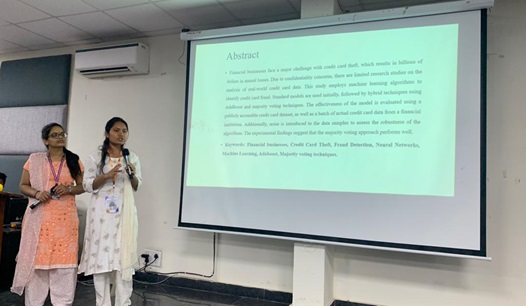
Flipped Classrooms: The Department of AI&ML also uses flipped classrooms as a teaching method. In a flipped classroom, students learn the course material outside of class through online lectures, videos, or readings, and then come to class to engage in activities, discussions, and problem-solving exercises. This approach can help students develop a deeper understanding of the material and allow for more interactive and collaborative learning.
For example, students in the B.Tech AI&ML program may be provided with online video lectures or readings on a specific topic, and then come to class to engage in discussions and problem-solving exercises related to the topic. This approach not only helps students to develop a deeper understanding of the material, but also provides them with the opportunity to engage in interactive and collaborative learning, which can enhance their critical thinking and problem-solving skills.
Active Learning: The Department of AI&ML also uses active learning as a teaching method. Active learning involves engaging students in the learning process through hands-on activities, discussions, and problem-solving exercises. This approach can help students develop a deeper understanding of the material and enhance their critical thinking and problem-solving skills.
For example, students in the B.Tech AI&ML program may engage in hands-on activities, such as building and testing machine learning algorithms or working on real-world projects that require data analysis and prediction. Students may also engage in discussions and problem-solving exercises related to the course material. This approach not only helps students to develop a deeper understanding of the material, but also provides them with the opportunity to engage in interactive and collaborative learning, which can enhance their critical thinking and problem-solving skills.
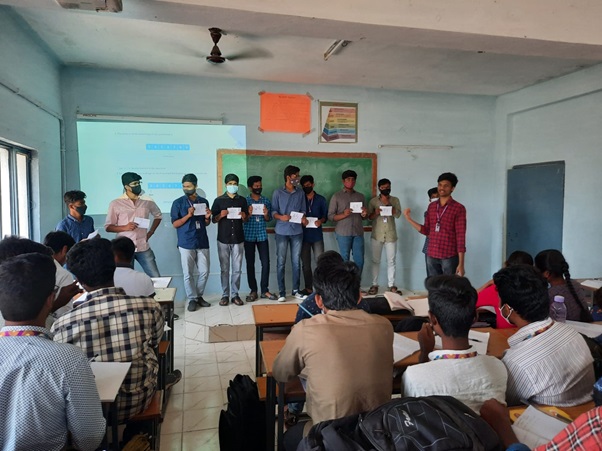
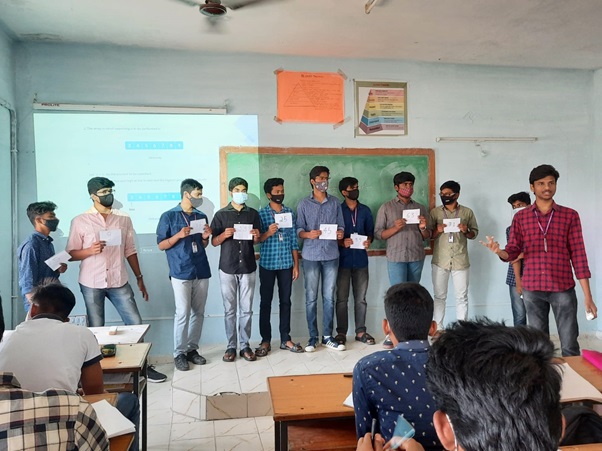
Blended Learning: Blended learning involves combining online learning with traditional classroom methods. This approach can provide students with flexibility and convenience, as well as access to a variety of multimedia materials and interactive simulations. In a blended learning environment, students can work at their own pace and have the opportunity to engage in interactive and collaborative learning.
Peer Teaching: Peer teaching involves having students teach and learn from each other. This approach can help students develop leadership, communication, and critical thinking skills, while also providing opportunities for peer feedback and support.
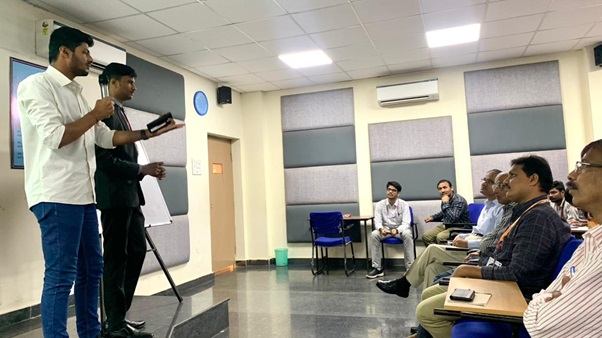
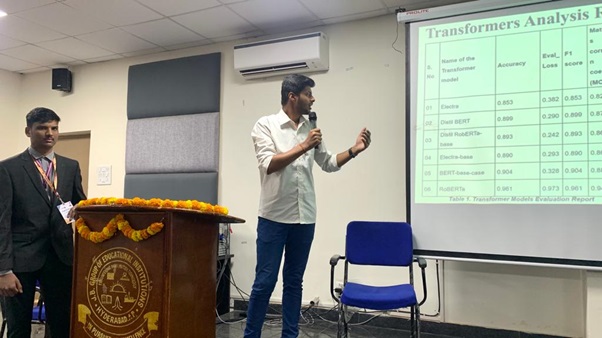
Simulation-Based Learning: Simulation-based learning involves using computer simulations to teach concepts and skills. This approach can provide students with a safe and controlled environment to practice and experiment with complex concepts, such as artificial intelligence and machine learning.
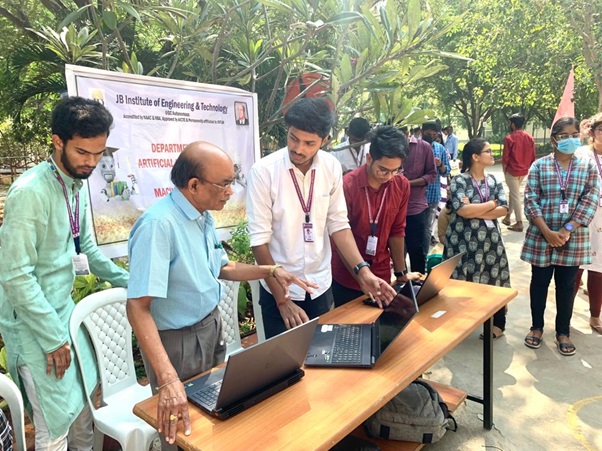
Gamification: Gamification involves using game elements, such as points, badges, and leaderboards, to motivate and engage students in learning. This approach can make learning more enjoyable and immersive, while also providing students with instant feedback and recognition for their achievements.
Personalized Learning: Personalized learning involves tailoring the learning experience to the individual needs and preferences of each student. This approach can help students to learn at their own pace and in a way that suits their learning style, while also providing opportunities for personalized feedback and support.
Inquiry-Based Learning: Inquiry-based learning involves having students explore and discover information through research and investigation. This approach can help students to develop critical thinking and problem-solving skills, as well as a deeper understanding of the subject matter.
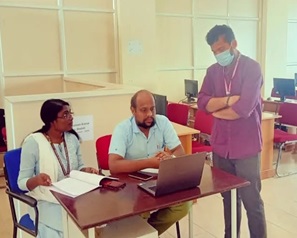
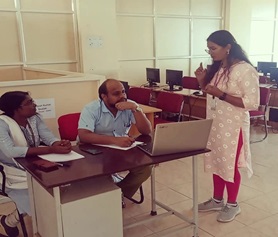
Service Learning: Service learning involves having students apply their knowledge and skills to real-world problems through community service or volunteer work. This approach can help students to develop empathy, social responsibility, and a deeper understanding of the impact of their work on society.
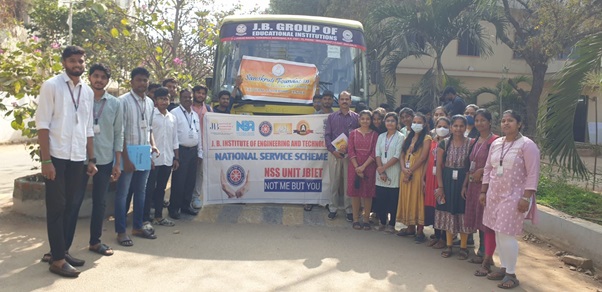
Conclusion: In conclusion: The Department of AI&ML is committed to innovative and effective teaching practices that help students to better understand and apply the concepts they are learning, as well as develop important skills that are necessary for success in the field. Incorporating these teaching and learning practices into the B.Tech AI&ML curriculum can provide students with a comprehensive and engaging learning experience that prepares them for success in their academic pursuits and careers. By using a combination of these practices, the department can cater to the diverse learning needs and preferences of its students, while also creating a collaborative and supportive learning environment.
Department Gallery
|
One Day Student Forum on “Applications of AI & Introduction to Julia Programming” conducted on 12-04-2023.
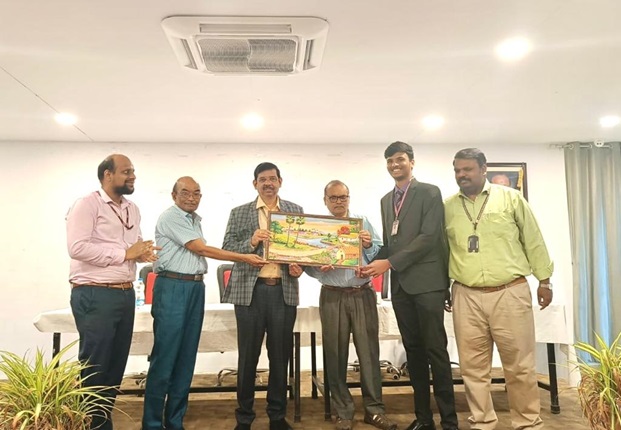 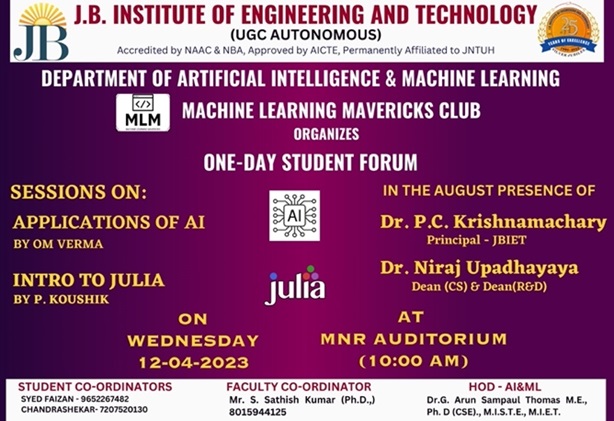 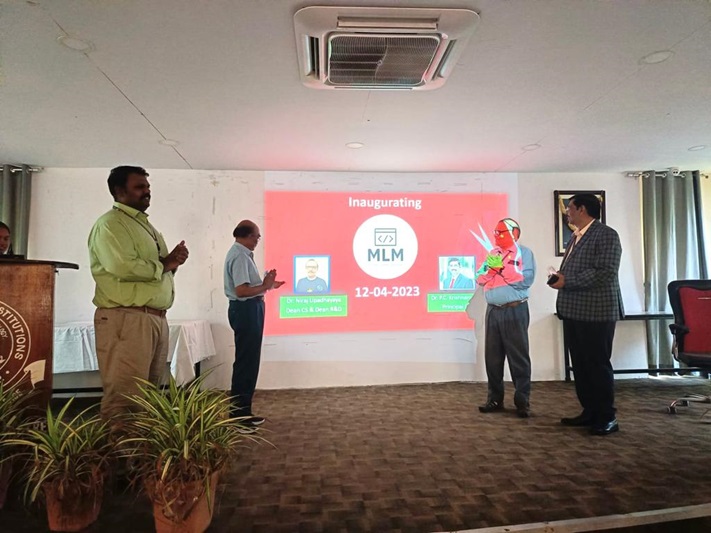
|
|
Industrial Visits to DRDL Hyderabad on 17-04-2023
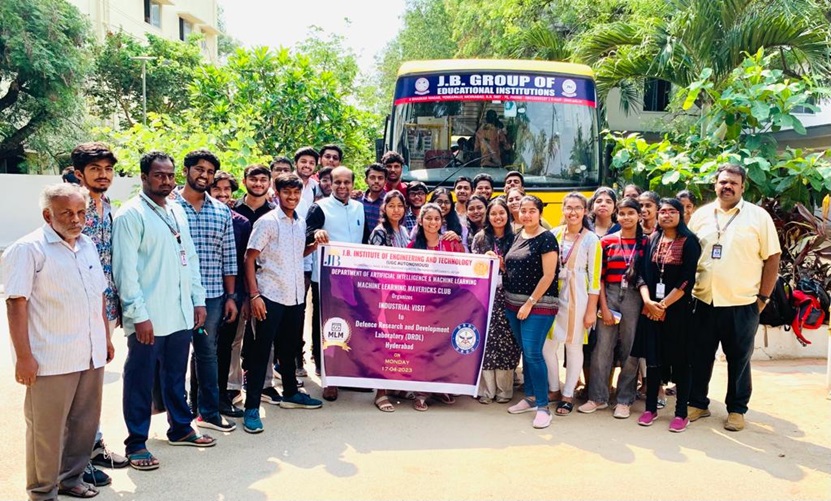 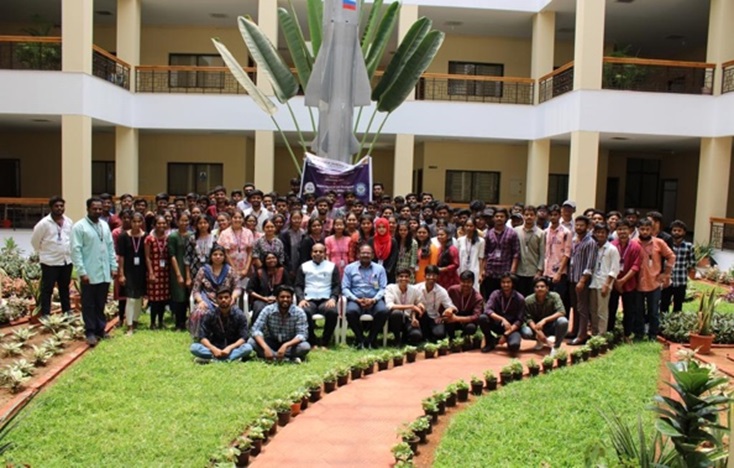 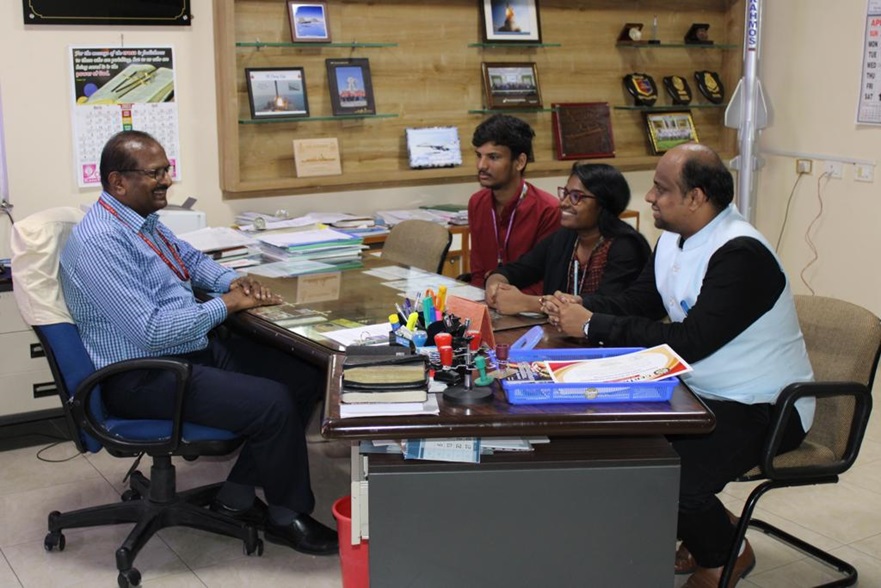
|









